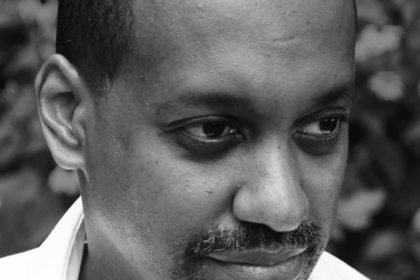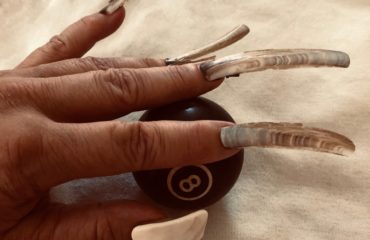QUINTESSENCE by Clifford Thompson

In the early morning, before anyone else is awake, the orange-yellow glow of the shaded lamp cuts the gray semi-darkness. Beside the lamp, on the sofa, you half-sit, half-lie among the cushions, reading a book with the help of glasses you have needed only recently; with a small device and earphones you listen to wordless music. The early hour, the dullness of the book, the rise and fall of the notes weaken your concentration, and without your knowing it, your eyes close. For moments you hang between this world and that, with the music as the link, but slowly the music carries you deeper, the gentle, woody, thoughtful clarinet line following a labyrinthine path, your path, through the terrain of piano notes long and short, tall and short, rising like buildings, stretching like streets.
On this gray street, between buildings of large, evenly cut stone, structures that run the gamut from gray-white to deepest black, all beneath a cloudy colorless sky, you walk, no one else in sight. To a rhythm you dimly perceive, you step, step, step in wing-tipped shoes and elegant, straight-legged, vaguely striped trousers—that is what you call them here, “trousers” … To your right, among all the sharply cut stone, you see a plate-glass window, with fanned letters reading “CAFÉ,” and you enter to find that it, too, has many variants of gray, the inside stretching back far, neither empty nor full, some of the many booths taken by lone people, others by groups of three or four. You sit in a booth. The waitress comes. Black hair falling to her shoulders frames black eyes that look at you knowingly as she hands you a cardboard menu and asks, “Do you know what you want?”
“I think I do, but I need a minute.” She turns and leaves quickly, almost as if offended. You hold the menu in both hands, the patched elbows of your tweed jacket on the table, but your eyes slide over the words like feet on a newly waxed floor. Anyway, it’s not here, the thing you want. But would you know it if you saw it? Does it have a name you would recognize? The thing you want is more of a feeling than an object, you realize: the feeling that what you’re doing gets to the center of your purpose, you core, your—
She is back, notepad in hand. “Do you know,” she says, conveying sympathy, “what you’d like?”
“I thought I did,” you tell her in a pained voice.
“Concentrate,” she says, the hand holding the notepad falling slowly to her side. You feel both grateful and guilty. She is a waitress, serving you for lousy money yet, it begins to seem, invested in you somehow, willing to do more than bring you coffee and cherry pie.
All you know to do about your guilt is try to help her help you. You stare at the columns and rows of booths. The men in ties, their fedoras hanging from gleaming hat racks beside the tables, the women holding cigarettes between dark-nailed fingers—all their faces nowhere near old and yet no age you’ve ever been or ever will be, as if they have progressed through their years via an alternate route—it’s all right, and yet there’s something else you seek, something, something—
“Quintessential,” you say.
The beginnings of a smile are on her face; she is pleased and surprised, as if you have come through after she had given up. Putting her pad and pencil in the pocket of her apron, she says, “Let me show you,” and walks away.
You follow. She stops at a narrow wooden door between two booths; you might have thought it was a broom closet, had you noticed it at all. She opens the door, and in the dimness you can just make out a set of wooden stairs. She goes up ahead of you, quickly, noiselessly, but when you try to keep up, you find the steps so short—half the length of your feet, if that—that the toes of your wingtips slam into wood each time; over and over, you stumble, catch yourself on the thin metal banister you can barely see, and start up again. She has disappeared by the time you reach the partly open door at the top. Just as your hand touches the knob, you smell something pleasant, a mustiness, one that you know from—
Yes, you think as you step through the door onto the old, dark wood of the floor, with an eighth of an inch of black space between some of the planks—
Books. They are piled high on many tables, they fill shelves that stretch to a high ceiling shrouded in darkness above cymbal-shaped hanging lamps. You wander among the tables, here and there dragging a finger across the surface of a book, then hear a gentle male voice: “May we assist you?”
You look to your right. Behind a counter that might once have been a bar in an Old West saloon, a bald and bespectacled man stands smiling, and beside him, also wearing glasses, also smiling, clutching a clipboard to her mohair sweater, is—the waitress.
“I think you already have,” you say, winking at her, trying to cover your confusion. She winks back, seeming to laugh, seeing through your façade.
The hanging lamps give the room a yellow-sepia cast. You pass rows of shelves, see single people perusing volumes, before choosing a shelf at random. The book you pull down has poetry, its imagery conjuring colors and pictures, its rhythms like music, like the clarinet music that brought you here—and suddenly, you hear that music again. Its rhythm is gentle, but persistent, and you think: what is the essence of rhythm but time? And what does time do except pass? This thought is vaguely disturbing, so you ignore it, focusing on the book. Reveling in this verse, you sit on the floor and recline, a pile of books conforming to the shape of your back. You let go of the book of poems, pick up another book from where your hand has fallen, read its passages of memoir about dressed-up important men and women holding drinks and talking quickly about what’s interesting and vital as the music plays, and you think, Yes, very close to the quintessence, and yet—
“I’m not there,” you say aloud. “I’m not doing it. The thing that I’m supposed to be doing. And”—you remember the clarinet music; is it still playing?—“time is running out.”
Your words seem to bring her to you. “Well then let’s go,” she says, stretching her hands down toward you, and you grab them, surprised at their firmness and her strength as she pulls you to your feet. You follow her through a maze of shelves to a door leading to a metal staircase; these take you down to any alley. Ten feet wide, made of cobblestone, this alley seems to have no end in either direction. The same is true of the building on the other side of it, its once-red bricks black from decades of industrial grime and soot, its walls so tall that its top is a silhouette against the sky. A fire escape hangs low, and she jumps, grabs on, pulls herself up. You follow. She disappears through a window above you. You follow. You climb through the window, from whose wooden frame white paint is peeling, and the first thing you see is her sitting behind an oak desk, wearing a jacket, tie, and fedora and pounding away at a manual typewriter. Others do the same around her at desks arranged in rows over a vast floor with large black-and-white checkerboard tiles; still others walk between the desks, wearing suspenders, shouting, but never shouting at her, at the—waitress?
She sees you and says, “Find a desk. Start writing.” Her voice is commanding, and now it feels ludicrous that you could ever have thought she was a waitress. No, she is an important person in this place, this place that seems to exist to help you, maybe others, maybe all, find—
“Writing about what?” you ask.
“The art show.”
“Shouldn’t I see it first?”
Without looking up she points to your left. You go to where she has pointed, down a gray-painted hallway with open doors on either side, some to classrooms, some to offices, some to film screenings. At the end of the hall is the art gallery—paintings with simple, representational figures and bright, bold colors, work you find so exciting that you hurry back to the newsroom, find a desk, roll a fresh sheet of paper into the shiny black and silver manual, make the clack clack clack of those first keystrokes—as satisfying as the first swallow of cold beer or good coffee—each letter carved clean in black into the gleaming virgin white, clack clack clack about the paintings, their forms, their bright reds and yellows and blues, and then… you stop, bewildered.
“It’s not me,” you say. But now you know what to do: you pull that sheet from the typewriter, put in another, and start to write, not giving thoughts about someone else’s art but making your own. You go deep into your experiences; some of it is real, some made up, but it gets at your essence, your story: the years of your life spent doing things because these were the things people did, all the while feeling a tug from another direction. You’re writing it now, you’re cooking now, and yet…
“Well,” she says, standing in front of your desk, “what’s wrong now?”
You point down the hall, where light from a film screening flickers on the walls. “Down there,” you say, “outside, all around, there’s a big world to appreciate, so many things to take in.”
“And you were doing that.”
“Yes, but it came to feel empty, it didn’t feel like mine.”
“And so you started to make something that was yours.”
“But that just closed me off to what was around me.”
“What is it,” she says, “that you want?”
“All of it,” you say.
“At once?”
You hesitate a moment. You begin to speak but stop because you hear music. The clarinet music. It is much the same as before, but with a new urgency, making you aware, really aware now, of time. Time brought you here; you are an event in time. But it is a friend and an enemy. It gives meaning to the things you do, but—and?—limits your chances to do them. So what is it you must do? You have tried, and searched, and… Ah. You begin to relax, even as you feel the urgency even more.
“I’ve got to get out of here,” you say.
She follows you this time as you head the only way you know—the way you came: down the fire escape, across the alley, up the stairs, past the books, down the stairs, through the café, and out to the still-empty street. In the street, the music is louder. You stop, turn to face her. She takes your hands, looks into your eyes. You can’t find the words, and she, who knows them, won’t say them aloud. But in her eyes you see approval. You give her hands, these gentle, firm hands of the universe, a final squeeze. You turn and run.



